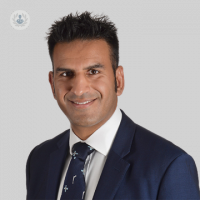Robotic surgery in orthopaedics: revolutionising joint health
Written in association with:Robotic surgery in orthopaedics is transforming the way joint surgeries are performed, offering unparalleled precision, improved outcomes, and faster recovery times for patients. By integrating advanced robotic systems with the expertise of orthopaedic surgeons, this innovative approach is setting new standards in the treatment of joint conditions, particularly in knee and hip replacements.
Read on to find out more about robotic surgery in orthopaedics as revered consultant orthopaedic surgeon, Mr Al-Amin Kassam, shares his expert insights.

What is robotic surgery, and how is it used in orthopaedics?
Robotic surgery in orthopaedics involves the use of computer-assisted robotic systems to aid surgeons in performing highly precise and minimally invasive procedures. These systems provide detailed 3D imaging, enhanced dexterity, and improved control during surgery. The most widely known robotic system in orthopaedic surgery is the MAKO system, used primarily for knee and hip replacements.
What are the advantages of robotic orthopaedic surgery?
- Enhanced precision: Robotic systems allow for highly accurate planning and execution of surgical procedures. The pre-operative planning software helps surgeons create a personalized surgical plan based on each patient’s unique anatomy. During surgery, the robotic arm assists in precise bone cutting and implant placement, reducing the risk of human error.
- Minimally invasive approach: Robotic surgery typically requires smaller incisions compared to traditional open surgery. This minimally invasive approach results in less tissue damage, reduced blood loss, and lower risk of infection, leading to faster recovery times and less postoperative pain.
- Improved implant positioning: Proper alignment and positioning of implants are crucial for the longevity and success of joint replacements. Robotic assistance ensures optimal placement of implants, improving the overall function and lifespan of the artificial joint. This can result in better joint stability and more natural movement for the patient.
- Customised surgical planning: Each robotic-assisted surgery is tailored to the patient’s specific anatomy. Advanced imaging and mapping techniques allow for a detailed preoperative plan that guides the surgeon during the procedure, ensuring a highly personalised approach.
What are some common robotic orthopaedic procedures?
Robotic technology is most commonly used in the following orthopaedic procedures:
- Total knee replacement: The MAKO robotic system assists surgeons in performing precise bone cuts and optimal implant positioning, enhancing the alignment and function of the knee joint.
- Partial knee replacement: For patients with arthritis confined to one part of the knee, robotic systems can accurately target and replace only the affected area, preserving more of the patient’s natural bone and tissue.
- Total hip replacement: Robotic systems aid in the accurate placement of hip implants, improving joint function and reducing the risk of dislocation.
If you wish to make an appointment today with Mr Al-Amin Kassam, just visit his Top Doctors profile today.


